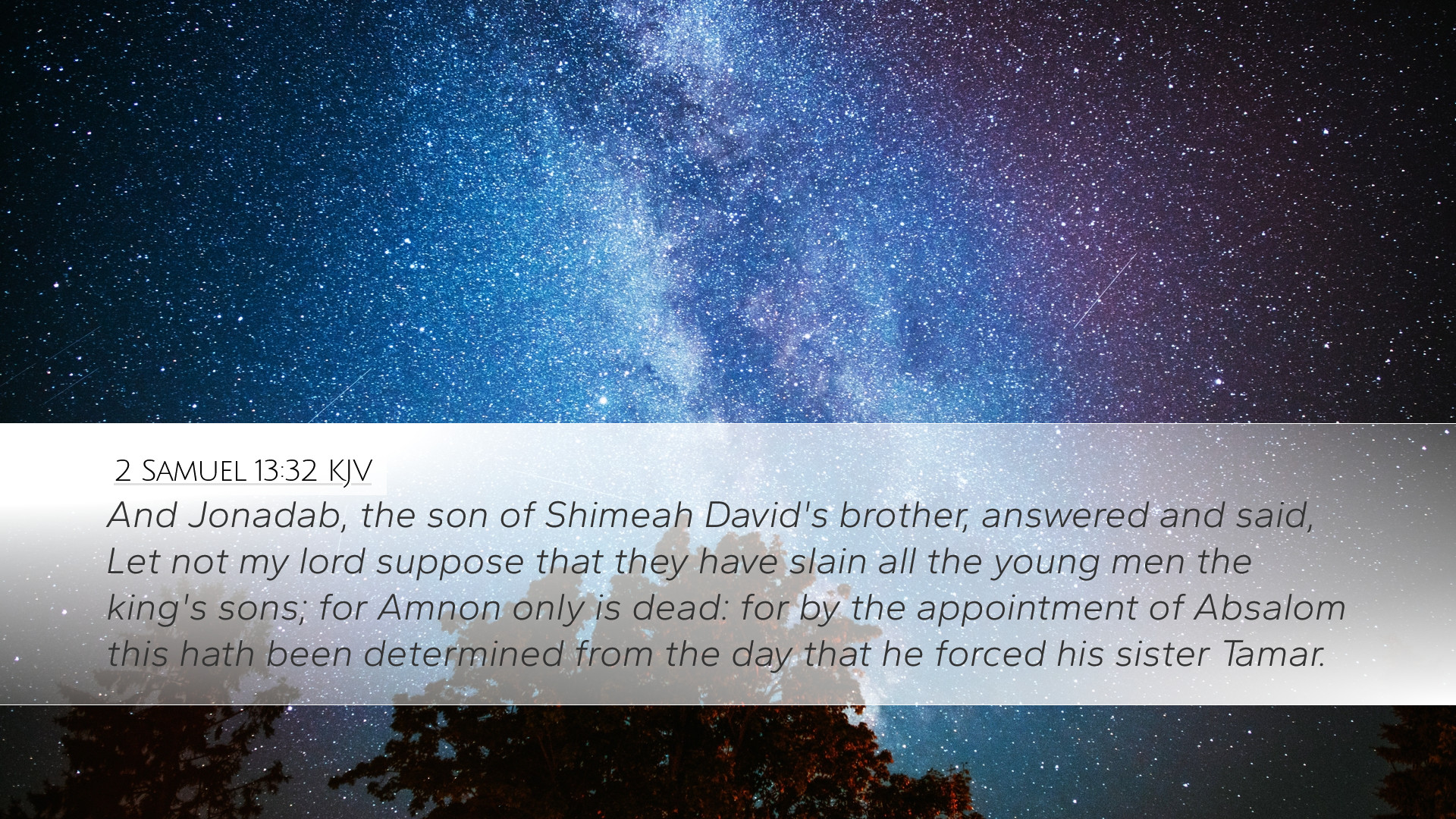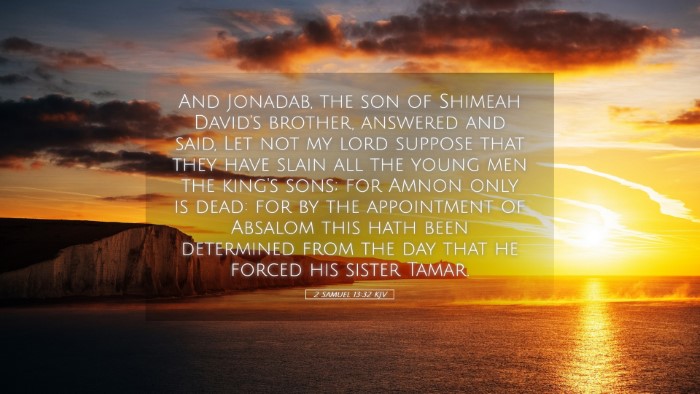Commentary on 2 Samuel 13:32
Verse: 2 Samuel 13:32 - "But Jonadab, the son of Shimeah, David’s brother, answered and said, 'Let not my lord suppose that they have slain all the young men, the king’s sons; for Amnon only is dead: for by the appointment of Absalom this hath been determined from the day that he forced his sister Tamar.'
Introduction
This profound and tumultuous verse comes at a pivotal moment in the narrative of 2 Samuel. It captures the aftermath of a tragic act of violence—the murder of Amnon by his brother Absalom, a calculated move driven by vengeance over the rape of Tamar. In it, we see not only the unfolding of familial strife but also the providential hand of God at work amid human sin and decision. Public domain commentaries from Matthew Henry, Albert Barnes, and Adam Clarke discuss the implications and broader context of this passage, providing insight into its theological significance and lessons for contemporary readers.
Contextual Analysis
The events leading to 2 Samuel 13:32 are steeped in moral corruption and familial dysfunction. The actions of Amnon, who lusts after and eventually violates his half-sister Tamar, set the stage for a grave response from Absalom, who seeks justice for the wrong done to his sister. Jonadab’s intervention as a character brings forth the theme of wisdom juxtaposed against folly.
Character of Jonadab
Jonadab, as described in this verse, is the son of Shimeah, a brother of King David. His role is pivotal as he emerges in this moment of turmoil, displaying both cunning and practical wisdom. Matthew Henry comments on Jonadab’s character, noting how he acts as a counselor yet also seems to play a role in the unfolding tragedy. His early advice to Amnon about seducing Tamar ultimately leads to more destruction than reconciliation.
- Wise yet Deceptive: Jonadab is portrayed as wise, yet his wisdom can be considered duplicitous. He offers insight but does not advocate for righteousness, instead guiding Amnon down a path of destruction.
- Manipulator of Circumstances: His understanding of the political and familial landscape allows him to manipulate circumstances to his advantage. He is aware of Absalom’s intentions long before others, reflecting a deeply ingrained knowledge of human nature and familial relationships.
The Significance of Amnon’s Death
The death of Amnon is a climactic point that reflects both divine justice and human emotion. Albert Barnes emphasizes that this act was not random but a deliberate act of vengeance from Absalom, fulfilling the prophecy of pain within David’s household. Absalom, out of a deep sense of betrayal and injustice, takes fate into his own hands.
- Vengeance and Justice: The murder symbolizes Absalom’s quest for justice for Tamar. The severity of Amnon’s punishment may evoke mixed feelings, particularly regarding the justification of his death against the crime he committed.
- Fulfillment of Prophecy: David’s sin with Bathsheba had previously led to the message that “the sword shall never depart from your house” (2 Samuel 12:10). The death of Amnon is a furtherance of that prophetic word, illustrating the repercussions of moral failure as felt across generations.
Implications of the Announcement
Jonadab’s statement serves to clarify the situation for David, who may have presumed a complete loss of his family. Adam Clarke considers this act of announcing the truth as both merciful and shrewd. Jonadab seeks to mitigate the emotional turmoil for David by specifying that only Amnon has perished, indicating that Absalom’s actions were deliberate, not random violence against the royal family.
Theological Reflection
From a theological standpoint, this passage raises questions about justice, mercy, and the consequences of sin. The intricate familial relationships and their breakdown offer a glimpse into the complexities that characterize human interactions.
- Divine Sovereignty: Readers might recognize that God’s sovereignty undergirds these events. While humans plot, God’s plan prevails, and His justice will be served, even in the midst of human error.
- Moral Responsibility: This passage encourages reflection on moral accountability. Each character, whether Absalom, Amnon, or Jonadab, engages in a kind of moral reasoning that reveals failures that lead to destruction.
Application for Contemporary Readers
This text offers deep insights reflective of modern human experiences—betrayal, revenge, and the longing for justice. Pastors and theologians can draw from these narratives to address modern issues in their congregations and communities.
- Confronting Injustice: The quest for justice is a theme resonant in this account. Churches can consider how they handle matters of justice within their own congregations, emphasizing mercy while also seeking justice for those wronged.
- Community and Conflict Resolution: The breakdown of family and community showcased here highlights the necessity for a robust approach to conflict resolution. This passage encourages proactive engagement in addressing grievances before they fester into destruction.
Conclusion
2 Samuel 13:32 stands as a stark reminder of the human condition, the need for divine wisdom, and the pervasiveness of sin and its consequences. Through Jonadab's intervention, the narrative foreshadows future turmoil within David's reign, emphasizing that the impact of moral failings reverberates through generations. As we study this verse, let us ponder the implications of our actions, the need for righteous counsel, and the overarching sovereignty of God in our midst.


